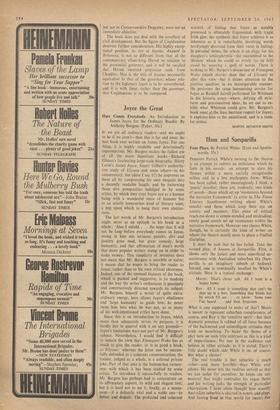Joyce the Great
Hare Comes Everybody. An Introduction to James Joyce for the Ordinary Reader, By Anthony Burgess. (Faber, 30s.) IF we are all ordinary readers—and we ought to be if we aren't—then this is far and away the best book ever written on James Joyce. For one thing, it is highly readable and determinedly unpretentious. Mr. Burgess makes the fullest use of all the more important books—Richard Ellman's fascinating large-scale biography, Harry Levin's James Joyce, Stuart Gilbert's authorita- tive study of Ulysses and some others—in his commentary; but (dare I say it?) he improves on them all by .compressing his own exegesis into a decently readable length, and by eschewing those dire pomposities indulged in by some critics, by which they treat Joyce not as a human being with a wonderful sense of humour but as an utterly humourless kind of literary saint, a peg upon which to hang their own abstrac- tions.
The last words of Mr. Burgess's introduction might serve as an epitaph to his book as a whole: 'Also I enfold . . . the hope that it will not be long before everybody comes to Joyce, seeing in him not tortuous puzzles, dirt and jesuitry gone mad, but great comedy, large humanity, and that affirmation of man's worth that more popular writers stamp on in order to make money.' This simplicity of intention does not mean that Mr. Burgess is unsubtle or naïve; it means that he wants to bring the reader to Joyce, rather than to his own critical cleverness. Indeed, one of the unusual features of the book, which is packed and suggestive, is its modesty and the way the writer's enthusiasm is 'genuinely and constructively directed towards its subject. Mr. Burgess, himself a writer of quite extra- ordinary energy, here allows Joyce's ebullience and `large humanity' to guide him; he never turns him into what he was not, as so many of his well-intentioned critics have done.
Since this is an introduction to Joyce, which more than adequately serves its purpose, it is hardly fair to quarrel with it on any grounds—
Joyce's limitations were not part of Mr. Burgess's subject. Nevertheless, I would find it difficult to sustain the view that Finnegans Wake has as much to give the reader, or is as good a book, as Ulysses: whereas the latter can be success- fully defended as a coherent communication, the former, judged as a whole, is a colossal private joke. Part of that joke is the humourless earnest- ness with which it has been studied by some critics. To introduce it successfully to readers, Mr. Burgess has perhaps had to concentrate on
its affirmatory aspects, its wild and elegant zest; but it is hard not to see it, finally, as a monu- ment—if a defiantly vital and a noble one—to defeat and despair. The profound and coherent warmth of feeling that Joyce so notably possessed is ultimately fragmented, with tragic Irish glee; the synthesis that Joyce achieves is as inhuman as it is remarkable, involving words terrifyingly divorced from their roots in feeling; in personal terms, the whole is an elegy for his daughter's schizophrenia—she succumbed to the 'disease' which he could so tritely (as he felt) avoid by weaving a spell of words. There is nothing in Mr. Burgess's discussion of Finnegans Wake (much shorter than that of Ulysses) to alter this view—but it draws attention to the positive qualities in an incomparable manner. He performs the same humanising service for Joyce as Randall Jarrell, performed for Whitman in his historic essay—where, defying all stric- tures and preconceived ideas, he set out to ex- hibit what Whitman could give. Mr. Burgess's book must at the least increase respect for Joyce; it explains him to the uninitiated, and is a tonic for critics.
MARTIN SEYMOUR-SMITH


































 Previous page
Previous page